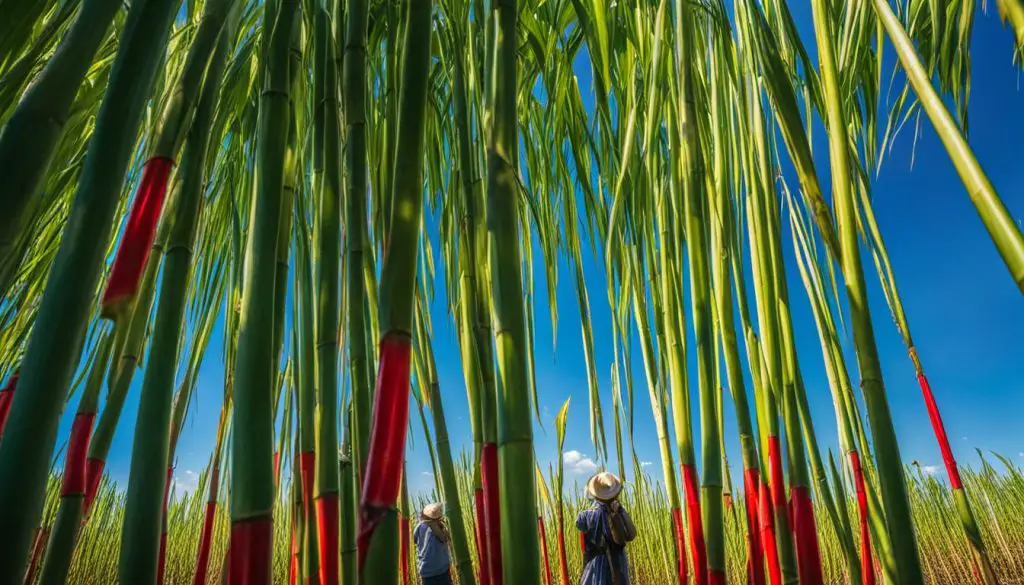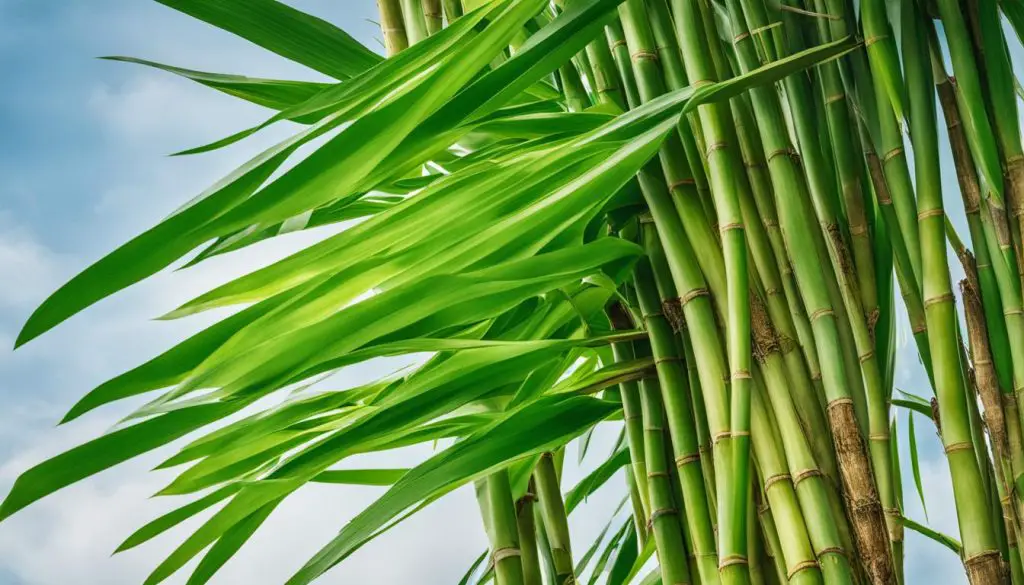Have you ever wondered if sugar cane holds a special significance in Chinese culture? According to Chinese beliefs and traditions, sugar cane is more than just a sweet treat. It is considered a symbol of good luck and prosperity, carrying auspicious meanings that are deeply ingrained in Chinese culture. From its association with abundance to its role in important celebrations, sugar cane plays a fascinating role in Chinese superstitions and beliefs. Let’s delve deeper into the symbolism and significance of sugar cane in Chinese culture.
Contents
- 1 Chinese New Year: The Importance of Sugar Cane
- 2 Sugar Cane in Hokkien New Year Celebrations
- 3 The Symbolic Meaning of Sugar Cane in Chinese Culture
- 4 Sugar Cane and Traditional New Year’s Foods
- 5 The Festive Spirit of Sugar Cane in Chinese New Year
- 6 Conclusion
- 7 FAQ
- 7.1 Does sugar cane bring good luck in Chinese culture?
- 7.2 What is the significance of sugar cane in Chinese New Year celebrations?
- 7.3 How is sugar cane used in Hokkien New Year celebrations?
- 7.4 What is the symbolic meaning of sugar cane in Chinese culture?
- 7.5 Is sugar cane included in traditional Chinese New Year foods?
- 7.6 What does sugar cane bring to Chinese New Year celebrations?
- 7.7 What are the beliefs and superstitions surrounding sugar cane in Chinese culture?
- 8 Source Links
Key Takeaways:
- Sugar cane is believed to bring good luck and prosperity in Chinese culture.
- It holds symbolic meanings of sweetness, abundance, and positive energy.
- Sugar cane is prominently featured during Chinese New Year celebrations and serves as an offering to deities and ancestors.
- In the Hokkien community, sugar cane is particularly revered during Hokkien New Year as a symbol of protection and good fortune.
- Chinese traditions incorporate sugar cane as an auspicious object and it is often part of festive decorations and traditional New Year’s foods.
Chinese New Year: The Importance of Sugar Cane
Chinese New Year is a time of great celebration and symbolism, with various traditions and customs observed to usher in good luck and prosperity for the year ahead. One such tradition that holds significant importance is the use of sugar cane. In Chinese superstitions, sugar cane is believed to symbolize luck and prosperity, making it an integral part of the festive season.
Sugar cane is considered a lucky object during Chinese New Year because of its association with sweetness, abundance, and positive energy. It is often chewed or consumed to attract good luck and positive vibes for the coming year. The symbolic meaning of sugar cane goes beyond its taste and texture – it represents the hopes and wishes for a fruitful and prosperous year ahead.
“Sugar cane is a symbol of sweetness and good fortune in Chinese culture. It is believed to bring abundance and luck to those who partake in its consumption during Chinese New Year festivities.”
Furthermore, sugar cane is used as an offering to deities and ancestors, symbolizing reverence and gratitude. By presenting sugar cane during prayers and rituals, individuals express their hopes for a year filled with blessings and good fortune. This practice reflects the deep-rooted beliefs and superstitions that have been passed down through generations in Chinese culture.
Lucky Objects in Chinese Traditions
Sugar cane is one of many lucky objects and symbols that hold significance in Chinese traditions. These objects are believed to attract positive energy, ward off negative influences, and bring good luck to individuals and families. Alongside sugar cane, other commonly used lucky objects during Chinese New Year include red envelopes (symbolizing good luck and prosperity), oranges (representing wealth and abundance), and fish (a symbol of surplus and prosperity).
| Lucky Objects | Symbolic Meaning |
|---|---|
| Sugar Cane | Good luck and prosperity |
| Red Envelopes | Financial blessings and good fortune |
| Oranges | Wealth and abundance |
| Fish | Surplus and prosperity |
These objects are not only used for decorative purposes but are also deeply ingrained in the traditions and rituals that take place during Chinese New Year. They serve as reminders of the values and beliefs held dear by the Chinese community, creating a festive atmosphere filled with hope, joy, and a sense of unity.
As the Chinese New Year festivities approach, the significance of sugar cane cannot be overlooked. Its presence in Chinese superstitions and traditions is a testament to its symbolic meaning of luck and prosperity. Whether it’s offered as an offering to deities, consumed for its sweetness, or displayed as a decorative element, sugar cane plays a vital role in creating a festive atmosphere and inviting good fortune into the lives of those who celebrate Chinese New Year.
Sugar Cane in Hokkien New Year Celebrations
In the Hokkien community, sugar cane holds a special place in the celebrations of Hokkien New Year. This auspicious day, which falls on the 9th day of Chinese New Year, is filled with traditions and beliefs that revolve around good fortune and protection. Sugar cane is deeply intertwined with these customs, symbolizing luck and prosperity.
In Hokkien culture, sugar cane is believed to bring good fortune and safeguard against harm. This belief stems from historical practices where Hokkiens sought refuge in sugar cane plantations during turbulent times. The plant’s tall and sturdy nature became a symbol of protection and resilience, and it became a tradition to offer sugar cane during Hokkien New Year prayers.
The offering of sugar cane during Hokkien New Year prayers is a way of expressing gratitude to the Jade Emperor for the blessings of the past year and seeking his continued protection and good luck for the year ahead. Sugar cane is seen as a powerful symbol of prosperity and is believed to attract positive energy and abundance into the lives of those who celebrate Hokkien traditions.
The Significance of Sugar Cane in Hokkien New Year Celebrations
In Hokkien New Year celebrations, sugar cane represents not only good fortune but also the resilience and strength of the Hokkien community. It serves as a reminder of the hardships overcome and the hope for a prosperous future. The offering of sugar cane during prayers is a way to honor tradition and invoke blessings for a year filled with happiness, health, and success.
During Hokkien New Year celebrations, sugar cane is also used in various festive decorations and activities. It is often displayed prominently in homes and businesses, symbolizing the desire for sweetness and abundance in all aspects of life. The presence of sugar cane in Hokkien New Year festivities creates an atmosphere of positivity and optimism, reinforcing the belief in the power of good fortune and the importance of cultural traditions.
Table: Symbols and Beliefs Associated with Sugar Cane in Hokkien New Year
| Symbols and Beliefs | Meaning |
|---|---|
| Sugar Cane | Symbol of good fortune and prosperity |
| Sugar Cane Plantations | Historical refuge and symbol of protection |
| Hokkien New Year Prayers | Expression of gratitude and seeking blessings |
| Festive Decorations | Representation of sweetness and abundance |
The table above showcases the symbols and beliefs associated with sugar cane in Hokkien New Year celebrations. These elements reflect the deep-rooted traditions and cultural significance of sugar cane in the Hokkien community, highlighting its connection to good fortune, protection, and prosperity.

The Symbolic Meaning of Sugar Cane in Chinese Culture
In Chinese culture, sugar cane holds deep symbolic meaning, representing good luck, abundance, and positive energy. It is considered as a significant element in various traditions and celebrations, reflecting the cultural beliefs and superstitions surrounding luck and prosperity.
The symbolism of sugar cane can be attributed to its association with sweetness and vitality. Just as sugar cane is known for its sweetness, it is believed that incorporating its symbolism in celebrations and everyday life can attract good fortune and positive experiences.
Sugar cane is often used in festive decorations, such as hanging stalks of sugar cane or incorporating sugar cane motifs in artwork. These visual representations serve as a reminder to embrace the sweetness of life and the potential for abundance and prosperity.
| Symbolism of Sugar Cane | Associated Meanings |
|---|---|
| Sweetness | Representing the enjoyment of life and attracting positive experiences |
| Abundance | Signifying the presence of wealth, fertility, and prosperity |
| Vitality | Symbolizing energy, strength, and the ability to overcome challenges |
By incorporating sugar cane’s symbolism into Chinese culture, individuals can express their hopes for a prosperous and fortunate life. Whether it is used as a decorative element during celebrations or simply as a reminder to appreciate the sweetness of life, sugar cane serves as a powerful symbol of good luck and abundance in Chinese traditions and beliefs.
Chinese Traditions and Lucky Objects
- Red Envelopes (Hong Bao): Symbolize good luck and are given as a gift during special occasions.
- Chinese Zodiac Animals: Each year is associated with an animal sign that represents different traits and characteristics.
- Dragon: A symbol of power, strength, and good luck in Chinese culture.
- Phoenix: Represents harmony, prosperity, and good fortune.
“Sugar cane adds a touch of sweetness and luck to Chinese celebrations, embodying the festive spirit and positive energy of the occasion.” – Chinese Proverb
Sugar Cane and Traditional New Year’s Foods
As you celebrate Chinese New Year, it’s not just about the vibrant decorations and festive atmosphere – the traditional New Year’s foods also play a significant role in welcoming luck and prosperity into your life. Alongside other lucky omens in Chinese culture, sugar cane is often included in the auspicious spread of dishes during this festive season. Its symbolism of sweetness and good fortune adds an extra layer of luck to the celebratory meals.
- Sugar cane is chewed or consumed as a way to attract positive energy and abundance for the year ahead.
- Other traditional New Year’s foods, such as fruits, dumplings, and fish, each carry their own auspicious symbolism.
Sugar cane’s presence in the New Year’s feast is not only about its delicious taste but also about embracing the hopes and wishes for a prosperous and fortunate year ahead.

The Significance of Sugar Cane in Chinese Culture
In Chinese culture, sugar cane holds a symbolic meaning that goes beyond its culinary use. It represents sweetness, vitality, and positive energy. This belief in its auspicious symbolism is ingrained in Chinese traditions and forms part of the overall tapestry of lucky objects and symbols.
“Sugar cane is deeply rooted in the cultural fabric of China, symbolizing not only abundance but also a reminder to savor the sweetness of life.”
Whether it’s incorporated in festive decorations or consumed as part of traditional New Year’s foods, sugar cane adds to the joyful atmosphere and embodies the positive spirit of Chinese New Year celebrations.
| New Year’s Foods | Symbolic Meaning |
|---|---|
| Sugar Cane | Good fortune, abundance, sweetness |
| Fruits | Fullness, wealth, fertility |
| Dumplings | Unity, prosperity, family togetherness |
| Fish | Wealth, prosperity, surplus |
The combination of these lucky foods adds to the auspicious atmosphere of the festive season and sets the stage for a year filled with good luck and blessings.
The Festive Spirit of Sugar Cane in Chinese New Year
The Chinese New Year is a time of celebration, tradition, and symbolism. One of the most significant symbols during this festive season is sugar cane. With its auspicious symbolism and association with good luck, sugar cane holds a special place in Chinese superstitions and traditions.
Throughout Chinese New Year, sugar cane is used in various ways to bring joy, luck, and abundance. It is often incorporated into decorations, such as vibrant hanging stalks or as motifs in artwork, adding a touch of sweetness and positive energy to homes and communities. Sugar cane is not only visually appealing but also carries a deeper meaning of prosperity and good fortune.
“Sugar cane is a symbol of sweetness, abundance, and positive energy.”
In addition to its decorative use, sugar cane is also consumed during Chinese New Year celebrations. It is often chewed or enjoyed in dishes, symbolizing the hope for a sweet and prosperous year ahead. As families gather to share meals and exchange wishes for good luck, the presence of sugar cane adds an extra layer of auspiciousness to the festive atmosphere.
The Festive Spirit of Sugar Cane in Chinese New Year can be summarized in the following table:
| Sugar Cane Symbolism | Chinese Superstitions | Chinese Culture and Good Luck |
|---|---|---|
| Sweetness | Used in decorations | Brings joy and abundance |
| Abundance | Chewed or consumed in dishes | Symbolizes a prosperous year ahead |
| Positive energy | Significant symbol during Chinese New Year | Represents the hope for good luck |
Conclusion
Sugar cane holds a special place in Chinese culture, symbolizing luck and prosperity. Its association with sweetness, abundance, and positive energy has made it an auspicious symbol in Chinese beliefs and superstitions. Whether it is chewed, consumed, or used in festive decorations, sugar cane carries a powerful symbolic meaning during important celebrations like Chinese New Year.
Chinese culture thrives on the belief in luck and prosperity, and sugar cane embodies these ideals. It represents the hopes and wishes for a fortunate and prosperous year ahead. Its presence in Chinese traditions and superstitions adds a sense of joy, abundance, and positive energy to households and communities.
As one of the many auspicious symbols in Chinese tradition, sugar cane serves as a reminder to embrace the sweetness of life and to seek good fortune in all aspects. From its use in traditional New Year’s foods to its incorporation in festive decorations, sugar cane plays a vital role in the celebration of Chinese New Year and other important occasions in Chinese culture.
In conclusion, sugar cane has deep-rooted significance in Chinese beliefs and superstitions, symbolizing luck, prosperity, and positive energy. By embracing the auspicious symbol of sugar cane, the hopes for a prosperous and fortunate year ahead are magnified in Chinese culture.
FAQ
Does sugar cane bring good luck in Chinese culture?
Yes, sugar cane is believed to symbolize good luck and prosperity in Chinese culture.
What is the significance of sugar cane in Chinese New Year celebrations?
Sugar cane holds a significant place in Chinese New Year traditions and is considered a lucky object symbolizing sweetness, abundance, and prosperity.
How is sugar cane used in Hokkien New Year celebrations?
In Hokkien New Year celebrations, sugar cane is offered as a symbol of protection, good fortune, and gratitude to the Jade Emperor.
What is the symbolic meaning of sugar cane in Chinese culture?
Sugar cane represents sweetness, vitality, and positive energy, and is often associated with good luck and abundance.
Is sugar cane included in traditional Chinese New Year foods?
Yes, sugar cane is often included in traditional Chinese New Year foods as a symbol of sweetness and good fortune.
What does sugar cane bring to Chinese New Year celebrations?
Sugar cane brings joy, luck, and a sense of abundance to households and communities during Chinese New Year celebrations.
What are the beliefs and superstitions surrounding sugar cane in Chinese culture?
Sugar cane is believed to bring luck and prosperity, and is considered an auspicious symbol in Chinese culture.





